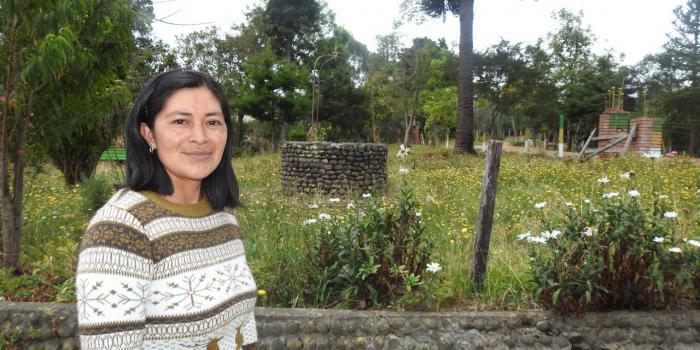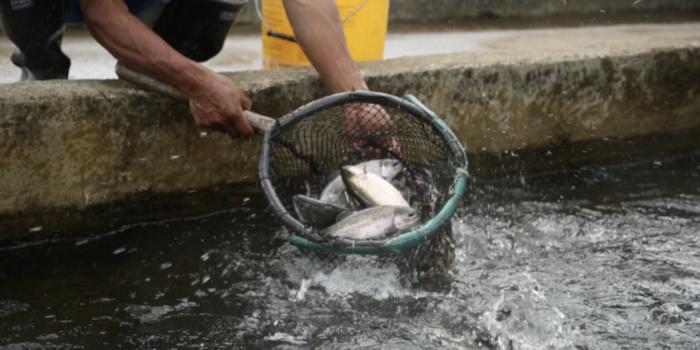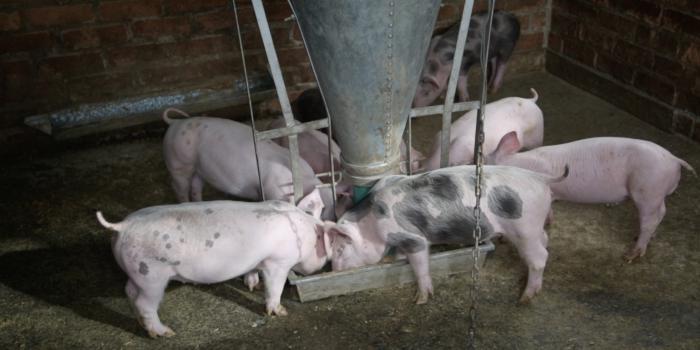
Rosmery Camayo, Ambalo people’s hopes bank
Her disposition to help people has allowed her to collaborate to set up a Revolving Fund in her reservation, which is a collective conflict victim group. The Fund has allowed families to access financial loans to add capital into their illusions. She is quite an example to get to know during the International Day of Indigenous Women.



At 33 years old, such a significant age, one morning in March 2020, Rosmery Camayo Itia walks towards the town hall. 30 minutes before she had been called to appear before the authorities of the Ampuile or Ambalo Reservation, a community, her community, settled in a valley dominated by guarangos, alders and oaks, 2,630 meters closer to heaven, to that world closer to her being — I don’t refer to the spirit world, because according to their worldview it surrounds us, like water, fire, earth, air, among others, to which they also appeal — this world is earthly close to the urban center of the municipality of Silvia, in Cauca, one hour from Popayan.
Her heart beats with a suspicion that call started. She only hoped crossing the doorway of the house where decisions are made wouldn’t be in vain. She enters the venue. Greets. They greet her. She must wait for other subjects being treated to dispel her concern, which in her case acquires tones of certainty, to place her life in order, although a setback could happen.
They announce it. Her hunch is true. Her resume: Human Rights Program in the Cauca Regional Indigenous Council (CRIC in its Spanish acronym) —which brings together around 11 indigenous peoples in the department—, as experience, and her Financial Administrator studies from Universidad del Cauca, made it possible that the universe, the sky or the spirits would have selected her to become the “Revolving fund for savings and credit for young people and ampiule women” Administrator.
That morning in March is her initiation. Without signing agreements or anything like it. In her culture there aren’t temporary or indefinite employment contracts. The verbal agreement is valid, not because it can be supported by a labor code, but because it is a commitment that is established between two souls: the individual and the one from the community.
Rosmery must manage and complete the papers so this kind of bank to opens its doors to the public. The requirements for credit — being part of the Ambalo people is imperative — and the formats are essential roles at this stage since the interest rates had previously been agreed with the community.
Days later, the papers are ready, and the authorities announce to the community, made up of 1,108 families, that the loans are waiting for them.
Previous studies
Reaching that goal had its obstacles. The main obstruction was the violence generated by the guerrillas in the 80s and 90s, an intrusion into their territory and their worldview that threatened to exile them from the world of spirits and nature, whom they understand and follow, to struggle in this urban world that they do not understand and that doesn’t understand them, with some exceptions. It wasn’t the almost daily folly the news broadcasts today about the northern border of Cauca — Caloto, Corinto, Toribio — but it did make them roam many times between extremes of terror and harmony.
For two decades “there was a partial loss of territorial autonomy, of proper law, of self-administration, since the indigenous authorities couldn’t exercise control; they wanted to transit freely through the territory, and the ‘elders’ always opposed by telling them the territory is sacred, which prompted them to retaliate against the leaders."
In addition, they dishonored the people with "extortions for the wealthiest families and young people forced recruitment."
It’s almost impossible to face that outrage and not wiping away tears; the indigenous guard was disarmed on two fronts: they lacked weapons to confront them, in addition to the lack of military training, and the lack of revenge habits.
The guerrillas' blacklist established to silence their culture: they censored their rituals, their community and family celebrations, and severing that reference stopped passing their customs to the new generations.
However, violence isn’t to blame for the waning state of the ampule language. "Only some elders speak it." A shroud is spread over it because new generations weren’t used to speak it.
As a showcase of that decadence, in the Ambalo community are diverse couples or marriages, but not in the gender sense, but in the mixture of peoples. Nasa-ampiule, misak-ampiule couples, who don’t speak to their children in Ambalo language, not because they don’t want to, but because their parents skipped that lesson. Rosmery went through this. Her parents didn't teach her, and she made the same mistake. Her ampiule husband doesn't speak it either. A deficiency that contrasts with other communities. "In my town there are people who, because of their relationships, do in fact speak Nasa or Misak."
The blacklist mercilessly crossed out their doctors or 'elders', equivalent in other communities to the knowers, shamans, mamos or taitas, spiritual legatees whose knowledge is only transferred to those who have inherited healing and/or clairvoyant gifts, a distinction some women have within her people, because "in matters of spiritual evolution there isn’t chauvinism."
However, finishing an Amerindian person isn’t like smoking a Piel Roja (a cigarette brand which translates Redskin), even when the intention is the same: to leave the ashes to the dustpan. Simply because the soul of a community cannot be annihilated.
The guerrillas abandoned their territory, perhaps due to a connection of incidents: the climate and the land weren’t favorable to their intentions or maybe those invisible forces in which the indigenous people trust their well-being. Perhaps that is why her community was never in a terminal state. Now their convalescent customs require patience.
Towards 2015, her community reached the Unit for the Victims, this because the Decree Law 4633 gives them the right to be treated and repaired as an indigenous people. Those promising meetings, transformed into an integral collective reparation plan, began to materialize in 2018.
The entity gave them resources in 284 million pesos COP, which after a request from the reservation’s women "aimed at the creation of a project to support their initiatives," became the “Revolving fund for savings and credit for young people and ampiule women”. In October 2019 it was devised, in January 2020 it materialized and in March of that year, thanks to Rosmery, it began its operations.
Approving Hope Quotas
After the bank’s opening announcement, "the first beneficiary was a man who lived in the paramo with the purpose of planting potatoes," says Rosmery; however, that podium isn’t very clear in her memory. The photo finish is disputed by the council of her people, which instantly requested a loan to build a food collection center that would serve as an antivirus in the face of the imminent pandemic. "Large orders were made for basic products such as panela, rice, corn, milk, eggs, and cleaning products, so people didn’t have to leave the shelter to stock up."
The loan application goes through a similar process as banking entities: filling out forms, reviewing them, a credit study by Rosmery, the credit committee made up by the reservation authorities and — after its final approval — to the Treasury. Perhaps the technical visit to the applicant's home or productive project, for approval, could make a difference.
“For the compensation received, we add with our own resources for 70 million pesos COP. 167 credits have been made. Resources have been rotated for 535 million COP, and at this moment we have accounts to collect for 364 million COP. Most of the credits are agricultural, five percent are for free investment and three percent are educational.”
The credits time is up to the crop. “If you grow potatoes, which have a period of eight to nine months, then you are given twice the harvest time, that is, a year and a half, and you can add to the capital after eight or nine months when you have the harvest or the sale, and the rest can be paid with the second harvest.”
Some have paid ahead of time. Ohers were affected by the strike and the weather, and the deadlines have been extended for them. But there is a payment that is anti-strike, anti-weather, anti-pandemic, that is, inexcusable, not even shaman rituals for good luck can stop them: interest. “They cannot be late in that payment, because we work the interests; when the date is met and the community member pays them, we make other loans with that money.”
But the Fund offers another payment system that can support the client's account, a unique line of credit or, to be precise, a credit barter line. “For example, if he has cattle, the person can pay with his calves, and if another community member needs calves, then we give them to him. For that, the appraisal is made with the market trade prices, and based on that the price is given.”
Even like any other bank, it has savings accounts.
Other lines of attention
The Unit's integral collective reparation plan has been felt in the ambalo community with other benefits: a truck and a tractor, used in agricultural work. "We manage the machinery, for its use we rent it at a moderate price, and it is only rented in our shelter."
It has also "favored the indigenous guard with endowments, to the elderly — ruanas, mochilas, plants —, and it has also helped women weavers, who spread the tradition with their handicrafts and sell them."
Their customs transmission has also been strengthened. They instill rituality in young people, as well as harmony and balance with nature; in children — at school —, there is focus on the organizational part of the town, the worldview and the ambalo language, to unmark it from oblivion.
In short, this is how they seek to perpetuate the spirit’s harmonization in their historiography, very similar to that soul state the proselytes of the new age or age of Aquarius now proclaim, that mystical union that raja yoga, Taoism, Buddhism, Kabbalah and Sufism also profess.
“The harmonization is done with rituals that involve sacred plants that help energy to be freer, to be able to balance it, to be able to take things more calmly and make better decisions. They ‘re also useful to scare away disease; for example, covid-19 attacks if the body is cold, so hot plants are used to scare it away.” The Fund has even benefited people with medicinal plant projects.
One of the steps of this ritual is the goals visualization, at least that is how Rosmery does it, and perhaps that is the hocus-pocus to fulfill the objective of her ambalo people: “Focusing on creating more advanced production strategies so that people can make their processes more technical, invent new projects in the community that come out of the families ideas, that more young people can have credits for studies and thus, access higher education, and in the future, to have resources to lend money to people outside the community."
This example has resonated in other reservations: people from other indigenous communities have asked about the credits, Rosmery says. She feels benefited by the knowledge acquired in the Fund, for contributing her grain of sand to the community in what she considers to be her life project: helping people, a design that began when, as a teenager, she fantasized reading novels by Garcia Marquez and Cervantes, which, thanks to hers and her people conviction, did not become a hojarasca (one of Garcia Marquez novels), much less a quixote affair.
(End/EGG/COG/RAM)






